|
|
|
Sort Order |
|
|
|
Items / Page
|
|
|
|
|
|
|
| Srl | Item |
| 1 |
ID:
086616
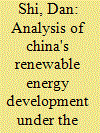

|
|
|
|
|
| Publication |
2009.
|
| Summary/Abstract |
At present, the development of renewable energy relies mainly on government support. The government invests in a considerable number of projects to improve public welfare and to assist in poverty relief. If China is to replace fossil fuels on a large scale with renewable energy sources, the production costs and prices of renewable energy must be brought down. All countries are facing the challenge of moving to a more secure and low-carbon energy system without weakening economic and social development. In this regard, China is facing an even greater challenge in terms of economic cost, as cheap coal remains the main energy form. Technical innovation and industrialization in the area of renewable energy is an important means of lowering cost. China is in for a period of high-speed development of its economy and the rising demand for energy is irreversible. If the technical progress and development speed of renewable energy lags behind the growth in demand, it will be difficult to realize the improvement of its energy structure.
|
|
|
|
|
|
|
|
|
|
|
|
|
|
|
|
| 2 |
ID:
094858


|
|
|
|
|
| Publication |
2010.
|
| Summary/Abstract |
The need to find cleaner, safer and less expensive sources of fuel in the city of Manaus, capital of the state of Amazonas (AM) in Brazil is inevitable due, among other factors, to the historical situation of the petroleum-derived fuel's large-scale use for power generation in the city by Brazil's energy planning. In this context, the use of natural gas in the province of Urucu, in the city of Coari countryside of the state of Amazons, is the best short-term solution, which will enable the substitution of petroleum-derived liquid fuels for the natural gas in the thermoelectric power plants in the city of Manaus and in seven other cities in the state, which are favored by the Coari-Manaus pipeline's main trajectory. This article presents the economic and environmental benefits with gas natural introduction in the energy matrix of isolated electrical system in Manaus. This project will be a great conquest for the city of Manaus, as a result of the Brazilian Energy Sector 20-year-planning, which will be completed in 2010, and will permit the beginning of a new growth-and-development cycle for the state of Amazonas and the Amazon itself.
|
|
|
|
|
|
|
|
|
|
|
|
|
|
|
|
| 3 |
ID:
122813


|
|
|
| 4 |
ID:
181527
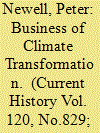

|
|
|
|
|
| Summary/Abstract |
Without deep transformations in the economy that go beyond incremental gains in decarbonization, we remain on course for catastrophic global heating. Some businesses have pledged to go carbon-neutral, carbon-trading schemes are expanding, and a growing divestment movement has pressured investment funds to shun fossil fuel producers. But financial forces are also part of the problem, still driving more production and consumption of fossil fuels. Achieving transformational shifts in finance, production, and governance calls for a more disruptive politics underpinned by shifts in power relations.
|
|
|
|
|
|
|
|
|
|
|
|
|
|
|
|
| 5 |
ID:
079244


|
|
|
|
|
| Publication |
2007.
|
| Summary/Abstract |
Shaping a pathway for global development in light of climate change and oil depletion need not imply radical disruption or widespread social harm
|
|
|
|
|
|
|
|
|
|
|
|
|
|
|
|
| 6 |
ID:
186426
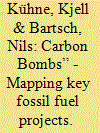

|
|
|
|
|
| Summary/Abstract |
Meeting the Paris targets requires reducing both fossil fuel demand and supply, and closing the “production gap” between climate targets and energy policy. But there is no supply-side mitigation roadmap yet. We need criteria to decide where to focus efforts.
Here, we identify the 425 biggest fossil fuel extraction projects globally (defined as >1 gigaton potential CO2 emissions). We list these “carbon bombs” by name, show in which countries they are located and calculate their potential emissions which combined exceed the global 1.5 °C carbon budget by a factor of two. Already producing carbon bombs account for a significant percentage of global fossil fuel extraction. But 40% of carbon bombs have not yet started extraction.
|
|
|
|
|
|
|
|
|
|
|
|
|
|
|
|
| 7 |
ID:
137272


|
|
|
|
|
| Summary/Abstract |
As the threats of climate change grow, the need to reduce carbon dioxide (CO2) emissions from fossil fuel burning is increasingly acknowledged by governments around the world. The potential of carbon capture and storage (CCS), a set of technologies that offers a politically appealing vision of a ‘cleaner’ way to use fossil fuels, has provided powerful motivation for large public and private investments in CCS technology. But investing in CCS is controversial because, although some consider it a critical climate mitigation technology, others view it as an expensive fossil fuel subsidy that could inadvertently perpetuate, rather than reduce, fossil fuel reliance.
|
|
|
|
|
|
|
|
|
|
|
|
|
|
|
|
| 8 |
ID:
158914
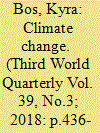

|
|
|
|
|
| Summary/Abstract |
Under the Paris Agreement, 80% of all proven fossil fuel reserves become stranded resources and investments already made in such resources turn into stranded assets. Much of the existing literature focuses on equitable burden sharing; only a few articles examine the risks for developing countries that invest in new fossil fuels. Hence, this paper addresses the question: What are the risks of investing in fossil fuels for developing countries? In doing so, it examines Kenya, a prospective fossil fuel producer, and China, an investor in fossil fuels. In terms of short- to long-term risks, ignoring new fossil fuels and investing in renewables is favourable and politically, socially, ecologically and economically more rewarding, not least because latecomers to development run the risk of having to compensate investors when new fossil fuel assets strand prematurely and become unrecoverable.
|
|
|
|
|
|
|
|
|
|
|
|
|
|
|
|
| 9 |
ID:
127913


|
|
|
|
|
| Publication |
2014.
|
| Summary/Abstract |
This paper analyzes the distributional implications of an illustrative $15 carbon tax imposed in 2010 on carbon in fossil fuels. We analyze its incidence across income classes and regions, both in isolation and when combined with measures that apply the carbon tax revenue to lowering other distortionary taxes in the economy. Consistent with earlier findings, we find that a carbon tax is regressive. Using tax swap simulations, we then subtract the burden of other taxes the carbon tax revenue could displace, and compute the net effect on households under three assumptions about how capital and labor income might be distributed.
|
|
|
|
|
|
|
|
|
|
|
|
|
|
|
|
| 10 |
ID:
121031


|
|
|
|
|
| Publication |
2013.
|
| Summary/Abstract |
Despite efforts by some congressional legislators to pass laws to limit greenhouse gas emissions and reduce the use of fossil fuels, no such laws have yet been adopted. Is this failure to pass new laws attributable to a lack of public desire for such legislation? Data from national surveys support two answers to this question. First, large majorities of Americans have endorsed a variety of policies designed to reduce greenhouse gas emissions; second, policy support has been consistent across years and across scopes and types of policies. Popular policies include fuel economy and energy-efficiency standards, mandated use of renewable sources, and limitations on emissions by utilities and by businesses more generally. Support for policies has been price sensitive, and the American public appears to have been willing to pay enough money for these purposes to cover their costs. Consistent with these policy endorsements, surveys show that large majorities of Americans believe that global warming has been happening, that it is attributable to human activity, and that future warming will be a threat if unaddressed. Not surprisingly, these beliefs appear to have been important drivers of public support for policies designed to reform energy generation and use. Thus, it seems inappropriate to attribute lack of legislation to lack of public support in these arenas.
|
|
|
|
|
|
|
|
|
|
|
|
|
|
|
|
| 11 |
ID:
101229


|
|
|
|
|
| Publication |
2010.
|
| Summary/Abstract |
Natural and environmental resources, ranging from supplies of fossil fuels to agricultural productivity, have long been recognized as part of the natural wealth of nations. Earth observations from the vantage point of space provide a unique means of understanding, measuring, and monitoring these resources both domestically and globally. This article argues that design of a national space strategy includes recognition of this role of Earth observations, and accords them priority commensurate with the value of the resources they observe. Recognizing the overlap between a national space strategy and a national security strategy, the article notes examples of the complementarities between Earth observations data from civilian and national security observing systems. The limited public transparency of data from national security sources hinders their usefulness in informing many policy decisions, however. The article also considers whether international cooperation in Earth observations, as in other national space activities, is warranted or workable in a national space strategy.
|
|
|
|
|
|
|
|
|
|
|
|
|
|
|
|
| 12 |
ID:
086879


|
|
|
|
|
| Publication |
2009.
|
| Summary/Abstract |
On February 9th, President Obama visited Elkhart, Indiana, the American community with the country's highest unemployment rate, 15.3 percent. (It had been only 4.7 percent the year before.) He was there to sell his stimulus bill, then moving through Congress and since signed. He noted that the bill would provide help for the workers who had lost their jobs and, more important, help them get their jobs back by reviving the economy.
The jobs that have vanished in Elkhart are predominantly in the recreational-vehicle industry, which is concentrated in the city of 52,000. With the severe recession the country is now experiencing, it is hardly surprising that this industry has been devastated. After all, an RV is expensive both to purchase and to operate and is hardly a necessity. But when the economy recovers, will those jobs come back as demand for RV's returns? Or, in the meantime, will new environmental regulations championed by Obama work to impede the sales of vehicles that get only a few miles to the gallon and thereby make job growth in Elkhart an impossibility?
|
|
|
|
|
|
|
|
|
|
|
|
|
|
|
|
| 13 |
ID:
110375


|
|
|
|
|
| Publication |
2011.
|
| Summary/Abstract |
This paper studies patenting dynamics in efficiency improving electricity generation technologies as an important indicator of innovation activity. We build a novel database of worldwide patent applications in efficiency-improving fossil fuel technologies for electricity generation and then analyse patenting trends over time and across countries. We find that patenting has mostly been stable over time, with a recent decreasing trend. OECD countries represent the top innovators and the top markets for technology. Some non-OECD countries, and particularly China, are also very active in terms of patenting activity in this sector. The majority of patents are first filed in OECD countries and only then in BRIC and other non-OECD countries. BRIC and other non-OECD countries apply for patents that are mostly marketed domestically, but BRIC countries represent important markets for patent duplication of OECD inventions. These results are indicative of significant technology transfer in the field of efficiency-improving technologies for electricity production.
|
|
|
|
|
|
|
|
|
|
|
|
|
|
|
|
| 14 |
ID:
158042


|
|
|
|
|
| Summary/Abstract |
In 2012, China and the European Union (EU) issued a joint declaration on energy security. It is unclear, however, what progress has been made since then in terms of applying the goals of the declaration. This paper sets out to assess the present state of China and the EU’s energy security, the potential for future cooperation, and the obstacles which stand in the way. The analysis assesses the extent to which the two actors can work together on improving energy infrastructure, diversifying supplies, and developing renewable and nuclear energy, possibly by finding synergies between China’s Belt and Road Initiative and the EU’s Juncker Plan. It also includes a re-examination of the concept of energy security to take account of the urgency of addressing the collapse of the global environment. Overall, the analysis suggests that although due to geographical and other constraints there may be limited opportunity for cooperation between the EU and China on securing oil and gas supplies, there are both scope and a pressing need for joint action in the field of renewable energy.
|
|
|
|
|
|
|
|
|
|
|
|
|
|
|
|
| 15 |
ID:
125874


|
|
|
|
|
| Publication |
2013.
|
| Summary/Abstract |
We estimate the short-run and long-run elasticities of various types of energy consumption and energy R&D to changes in oil prices and income of the 20 OECD countries over the period of 1980-2010 using the Nerlove partial adjustment model (NPAM). We find negative income elasticity for coal consumption but positive income elasticity for oil and gas consumption suggesting the importance of economic growth in encouraging the usage of cleaner energy from coal to oil and gas. By introducing time dummies into the regressions, we show that climatic mitigation policies are able to promote the usage of cleaner energies. Through the dynamic linkages between energy consumption and energy R&D, we find that fossil fuel consumption promotes fossil fuel R&D and fossil fuel R&D in turn drives its own consumption. Renewable energy R&D which is more responsive to economic growth reduces fossil fuel consumption and hence fossil fuel R&D.
|
|
|
|
|
|
|
|
|
|
|
|
|
|
|
|
| 16 |
ID:
128728
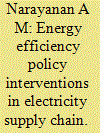

|
|
|
| 17 |
ID:
120953


|
|
|
| 18 |
ID:
110930


|
|
|
|
|
| Publication |
2012.
|
| Summary/Abstract |
Nearly 90 percent of the world's economy is fueled every year by digging up and burning about four cubic miles of the rotted remains of primeval swamp goo. With extraordinary skill, the world's most powerful industries have turned that oil, gas, and coal into affordable and convenient fuels and electricity that have created wealth, helped build modern civilization, and enriched the lives of billions.
|
|
|
|
|
|
|
|
|
|
|
|
|
|
|
|
| 19 |
ID:
062266


|
|
|
|
|
| Publication |
London, Pluto Press, 2005.
|
| Description |
vii, 325p.
|
| Standard Number |
0745320929
|
|
|
|
|
|
|
|
|
|
|
|
Copies: C:1/I:0,R:0,Q:0
Circulation
| Accession# | Call# | Current Location | Status | Policy | Location |
| 049709 | 333.82/MCK 049709 | Main | On Shelf | General | |
|
|
|
|
| 20 |
ID:
156649
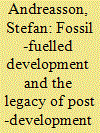

|
|
|
|
|
| Summary/Abstract |
This article examines the legacy of Post-Development theory, in particular its relevance and applicability to debates about Africa’s future. It scrutinises Post-Development theory, and its claims about the end of development, through the prisms of Africa’s continued pursuit of development and its political economy of energy. It considers the impact of these aspects of Africa’s developmental efforts on the ability of Post-Development theory to remain relevant in light of recent developments. Revisiting basic claims of Post-Development theory provides insights into the enduring disconnect and incommensurability between Africa’s twenty-first century socio-economic trajectories and the core assumptions of Post-Development theory.
|
|
|
|
|
|
|
|
|
|
|
|
|
|
|
|
|
|
|
|
|